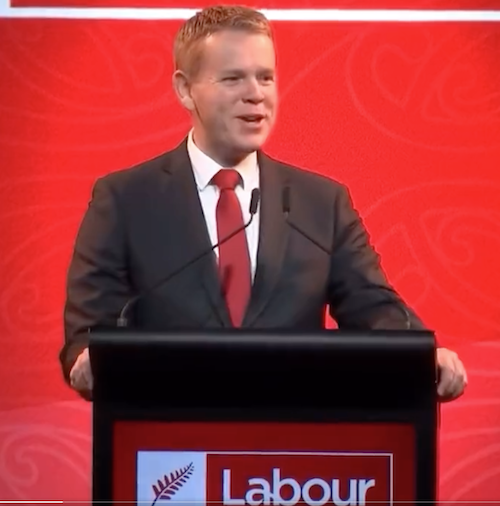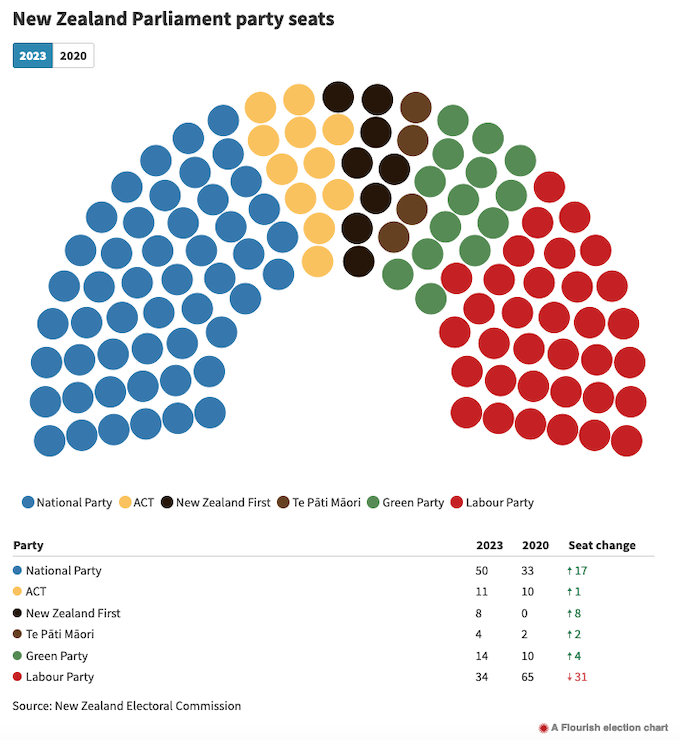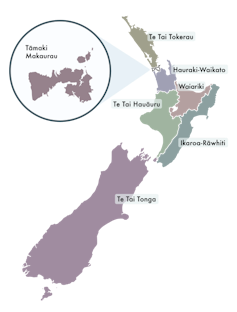By Debrin Foxcroft, Finlay Macdonald, Matt Garrow and Veronika Meduna
From winning a single-party majority in 2020, Labour’s vote has virtually halved in 2023 in the Aotearoa New Zealand general election.
Pre-election polls appear to have under-estimated support for National, which on the provisional results last night can form a government with ACT and will not need NZ First, despite those same polls pointing to a three-way split.
While the Greens and Te Pāti Māori both saw big gains, taking crucial electorate seats, it has been at the expense of Labour.

Special votes are yet to be counted, and Te Pāti Māori winning so many electorate seats will cause an “overhang”, increasing the size of Parliament and requiring a larger majority to govern.
There will also be a byelection in the Port Waikato electorate on November 25, which National is expected to win.
So the picture may change between now and November 3 when the official result is revealed.
But on last night’s count, the left bloc is out of power and the right is back.

Big shift in the Māori electorates
Te Pāti Māori has performed better than expected in the Māori electorates – taking down some titans of the Labour Party and winning four of the seven seats.

The party vote remained at 2.5 perecent — consistent with 2020.
One of the biggest upsets was 21-year-old Hana-Rawhiti Maipi-Clarke’s win over Labour stalwart Nanaia Mahuta in the Hauraki-Waikato electorate. Mahuta has represented the electorate since 2008 and has been in Parliament since 1996.
This was a must-win race for Mahuta, the current foreign affairs minister, after she announced she would not be running on the Labour party list.
Labour won all seven Māori seats in 2017 and six in 2020.
Advance voting
In 2017, 1.24 million votes were cast before election day, more than the previous two elections combined.
In 2020, this rose to 1.97 million people – an extremely high early vote figure attributable to the impact of the COVID-19 pandemic.
This year, more than 1.3 million New Zealanders cast advance votes before election day – higher than 2017 but significantly lower than 2020.
The comeback kid
After a dismal showing at the 2020 election, NZ First’s Winston Peters has yet again shown himself to be the comeback kid of New Zealand politics. Peters and his party have provisionally gained nearly 6.5 percent of the vote, giving them eight seats in Parliament.
On the current numbers, the National Party will not need NZ First to help form the government. But the result is still a massive reversal of fortune for Peters, who failed to meet the 5 percent threshold or win an electorate seat in 2020.
The heart of Wellington goes Green
Urban electorates in the capital Wellington have resoundingly shifted left, with wins for the Green Party’s Tamatha Paul in Wellington Central and Julie Anne Genter in Rongotai.
Chlöe Swarbrick has retained her seat in Auckland Central.
The Wellington electorates had previously been Labour strongholds. But the decision by outgoing Finance Minister Grant Robertson to compete as a list-only MP opened Wellington Central to Paul, currently a city councillor.
Genter takes the seat from outgoing Labour MP Paul Eagle.
Both Wellington electorates have also seen sizeable chunks of the party vote — 30 percent in Rongotai and almost 36 percent in Wellington Central — go to the Greens.
![]()
Debrin Foxcroft, deputy New Zealand editor, The Conversation; Finlay Macdonald, New Zealand editor, The Conversation; Matt Garrow, editorial web developer, The Conversation, and Veronika Meduna, science, health + environment New Zealand editor, The Conversation. This article is republished from The Conversation under a Creative Commons licence. Read the original article.

